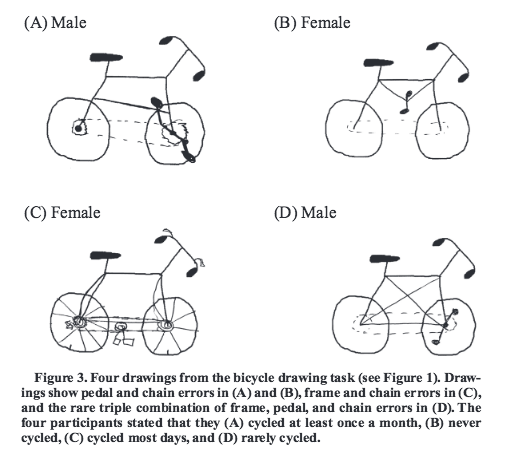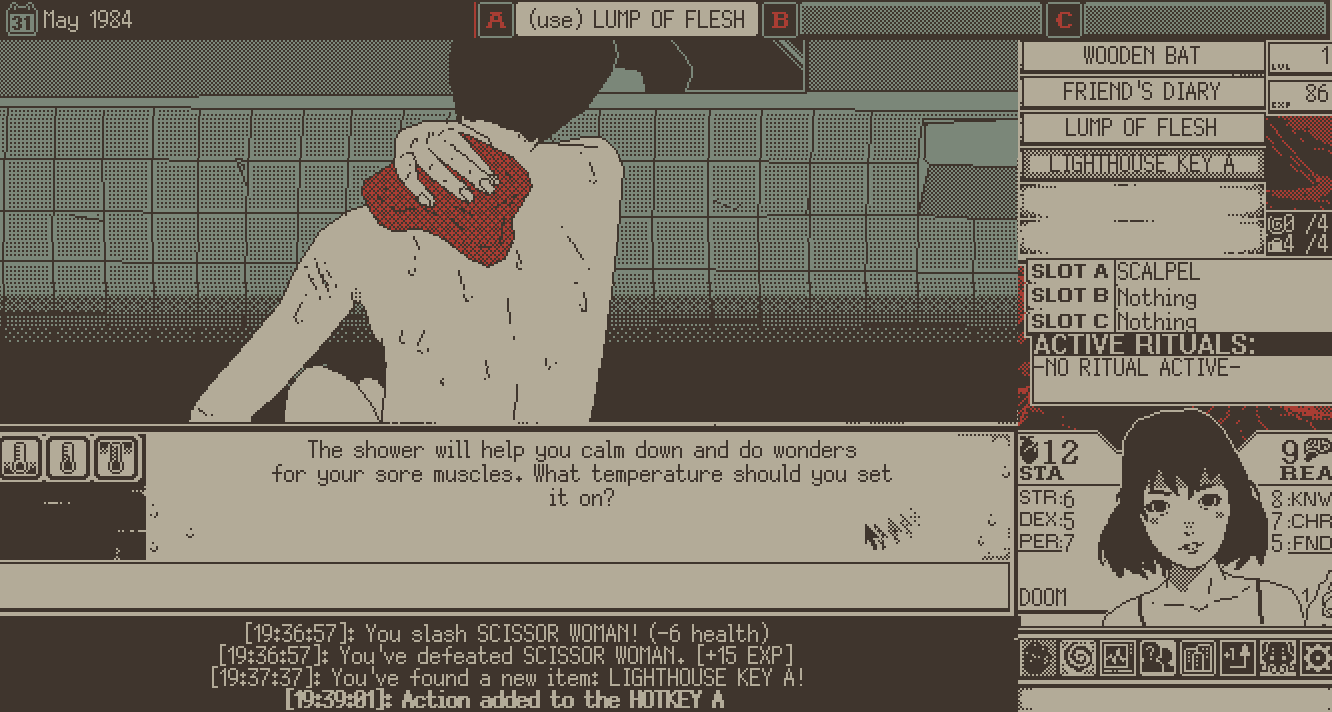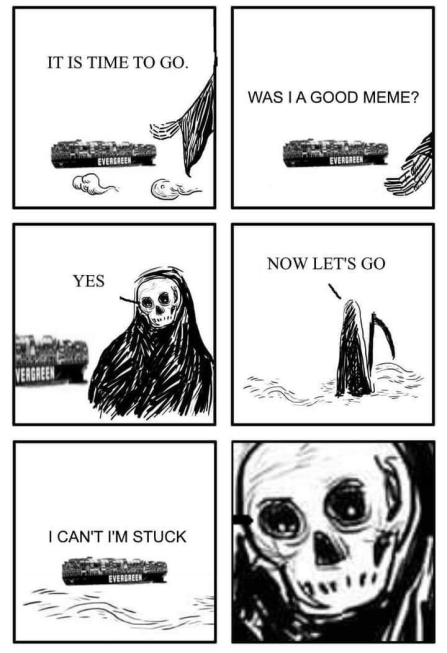Log: 4/2/2021
This week: Rick Roderick, the reconfiguration thesis, p2p and the far right, poorly drawn bicycles, bardcore, We Will Always Love You, and World of Horror.
Self Under Siege, Rick Roderick
@Rick Roderick on Baudrillard - Fatal Strategies
I re-visited this series of Rick Roderick’s lectures that were very formative for me. He has two other lecture series, “Nietzsche and the Post-Modern Condition” and “Philosophy and Human Values”, both of which were good (so far as I remember), but “Self Under Siege” is the one that stuck with me the most. It’s a compact but very accessible introduction to critical theory mixed in with musings on 90’s American politics and pop culture. The name series refers to the various ways the “self” is under attack: people losing their sense of self, the increasing control of bodies and minds through more and more insidious and powerful structures, the devaluing of human life (of oneself and of others), and so on. Older ideas of dystopia start to look quaint (“Orwell’s vision of a horrible future…a boot stamping on a human face forever, is a utopian image because he assumed there would be resistance and human faces”) as oppression and control grow ever more diffuse, invisible, and sophisticated. As depressing and discouraging as that is, Roderick usually tries to point towards something better throughout the lectures.
Roderick is unashamed in (and has a talent for) presenting concepts in a very clear, forgiving, and not morbidly serious way, though he never makes light of the topics. He speaks with a consciousness about the tropes and idiosyncrasies in how philosophy is developed and how philosophers behave; that philosophers themselves engage in all sorts of socially-contingent behaviors (writing a particular way, valuing certain kinds of arguments, ignoring certain people and traditions, etc) that muddle what they talk about and how they talk about it. And he always relates everything back to what he feels is the project of philosophy: human liberation. I wish more philosophy (or anything, really) was taught this way. Sadly he passed away relatively young in 2002. I would have loved to hear more of his lectures.
It’d be interesting to see an updated lecture series modeled off of “Self Under Siege” for today. I wonder how different it would be. There’s the internet of course, and many other developments, but it feels as though we’re still basically on the same trajectory that he and the philosophers he discusses laid out decades ago. The reason I revisited the lectures is because I’m reading Achille Mbembe’s Out of the Dark Night, and in the first part he reviews a lot of these recent developments–e.g. biosciences/biotechnology, neuroscience, expansion of the internet and ICTs, ecological/climate crisis, etc–and their causes, dynamics, and implications. It’s kind of like a compact version of what I imagine an updated “Self Under Siege” lecture series would be like, now that I think about it (at least in terms of topic coverage). Nothing sounded fundamentally different than what I remembered from those lectures, just dialed up 100 times. But maybe there’s some nuance there that I’m missing.
While revisiting those lectures I came across this interview with Roderick that I hadn’t seen before. He goes into more of his background growing up in West Texas, his understanding of critical theory, social change, and the labor movements of the time, and how he thinks about teaching (“Don’t leave my class saying ‘strike out against all authority’, based upon the authority of Rick Roderick. This is paradoxical. Find your own form of struggle, questioning, of living more fully”), among other things.
The Reconfiguration Thesis
A question that comes up again and again is the extent to which capitalist technologies and infrastructure can be used against or separate from capitalism itself. This falls under the umbrella of a more general question explored through writing like Langdon Winner’s “Do Artifacts Have Politics?” and expressed through quotes like Audrey Lorde’s “the master’s tools will never dismantle the master’s house”1. Working with computer technologies and adjacent to the tech industry exposes me to this question all the time, especially through positions like Fully Automated Luxury Communism (FALC), ecomodernism, xenofeminism, and so on, which are all positions that I at some point held myself. And while I don’t hold those positions anymore, I’m still sympathetic to them in a way (especially xenofeminism); at the very least I don’t totally reject the notion that technology has some liberatory potential (it seems impossible to defend or refute these positions in general), for me the question is more about coming up with a better rubric for discerning technologies with that potential (e.g. a better and more honest assessment of the ecological implications/environmental feasibility of something like FALC, or that technologies implicate us in certain relationships we might not want to be in, and whether or not such an intensely technologically-dependent society is even necessary to achieve social goals), and understanding if going whole-hog on that direction is the best use of my time.
Anyways…in light of the Suez Canal blockage and because this question makes up part of Fugue, I revisited Jasper Bernes’ “Logistics, Counterlogistics and the Communist Prospect” and Alberto Toscano’s response, “Lineaments of the Logistical State”, which explore this question (“the reconfiguration thesis”) in the context of logistics and commodity circulation. These are long pieces, and admittedly the latter half of the Toscano piece still goes over my head even after all these years, so I hope I’ve understood their main points.
Bernes argues a few points:
- Some main features of highly-developed logistics: it expands access to markets, the privileging of flexibility reduces the power of labor (“resiliency” not only in the face of natural disasters but strikes or unfriendly regulations as well), and just-in-time production reduces costs of storing goods/building up stocks.
- One important effect: has facilitated decline in local productive capacity, which makes regional movements more exposed to capitalist crackback and enshrines a dependency that can undermine revolutionary movements: “the need to maintain an export economy in order to buy crucial goods on the international markets — arms in particular — meant that revolutionary cadres and militants had to use direct and indirect force in order to induce workers to meet production targets.”
- Blockades/sabotage are actions that are targeted at circulation, as opposed to production: “The blockade, it seems, might assume an importance equal to the strike in the coming years”
- He proposes “counterlogistics”: essentially mapping out the network of logistics so as to identify chokepoints and to clearly see how otherwise disparate actions integrate to form a cohesive whole.
- As for the reconfiguration of logistics infrastructure, there are two main points I see:
- Can it be made useful to revolutionary interests? Such infrastructure is optimized for circulation of specific forms; particular ideological commitments or capitalist needs are baked in: “individually packaged boxes of cereal…sold and consumed in sizes and types that reflect certain social arrangements, such as the nuclear family” or for particular relations of trade (consumer and producer nations).
- Is it even needed? “For workers to seize the commanding heights offered by logistics — to seize, in other words, the control panel of the global factory — would mean for them to manage a system that is constitutively hostile to them and their needs, to oversee a system in which extreme wage differentials are built into the very infrastructure. Without those differentials, most supply-chains would become both wasteful and unnecessary.”
Toscano’s response, as far as I understood it, amounts to something along the lines of: well, most of it probably can’t be reconfigured, but we should be open to the possibility:
I stressed that any “reconfiguration” concerns an evaluation, both practical test and theoretical anticipation, of, as I had said, “what aspects of contemporary capitalism could be refunctioned in the passage to a communist society.” This implies that some (many, even most – the ratio is not decidable a priori) of these aspects could not be refunctioned at all (though they would still need to be somehow dealt with or disposed of).
And regarding blockades and sabotage, he makes the point that “disruption is not sufficiently linked to control”. To me this sounds less like a problem inherent in those tactics and more of a question of how they fit together into a broader movement, which is maybe what Bernes’ “counterlogistics” is getting at.
The Decentralized Web of Hate, Rebellious Data and Emmi Bevensee
Matt sent me this report on the far right’s use of p2p. We talked about it and it dawned on me that, although most of my exposure to p2p has been in a left libertarian/anarchist context, as a general ecosystem/approach to social platforms, it’s probably going to be first widely adopted by the far right. This report indicates that things are already heading this way.
It makes sense that p2p adoption would play out this way. The far right are the most visibly deplatformed by major sites, and so they have an actual need to find alternative platforms that are harder to moderate if they want to preserve their entire media ecosystem. The more popular approach to the problems of social media on the left is policy, e.g. anti-trust regulation, or even nationalizing such platforms (extremely unlikely). Because control over these platforms via policy actually looks feasible, alternative platforms look less necessary. This is obviously an incomplete picture, but hadn’t occurred to me before.
The Illusion of Explanatory Depth
The illusion of explanatory depth has been stuck in my head. From the paper that introduced the concept: “People feel they understand complex phenomena with far greater precision, coherence, and depth than they really do; they are subject to an illusion—an illusion of explanatory depth.” It’s when you feel like, “yeah I think I understand X”, and then when pressed to explain further, you realize you don’t understand X at all.
This is so common and less discussed than its closest counterpart, the Dunning-Kruger effect, which is usually used as a bludgeon to shame people (in internet discourse, at least). I like developing models and simulations precisely because it forces me to reckon with this illusion. I think this is exactly why people say that teaching is the best way to learn something.
One of the best/funniest demonstrations of the phenomena is asking people to draw bicycles from memory:

Bardcore
I got sucked into the world of bardcore (“medieval” covers of pop songs). There are a lot of really impressive covers, like this one of The Weeknd’s “Blinding Lights”:
@Blinding Lights (Medieval Style)
(this Arabic cover of “Blinding Lights” is also really good)
Some songs really lend themselves to the style, e.g. Lil Nas X’s “Old Town Road”, Attack on Titan’s final season theme, the Wu-Tang Clan’s “C.R.E.A.M”, and Outkast’s “Ms. Jackson” (these last two feel like they could be on the Morrowind soundtrack).
This cover of BLACKPINK & Selena Gomez’s “Ice Cream” in the “ancient Chinese” style is also extremely good:
@BLACKPINK, Selena Gomez - Ice Cream (Ancient Chinese Style)
There’s also a cover of BLACKPINK’s “Lovesick Girls”. I’m curious about what sample packs are being used here.
Some songs which don’t seem at all conducive to the style end up working really well, e.g. Daft Punk’s “One More Time”.
The comments on all these videos are also very entertaining (tons of jokes about modern problems in medieval times).
I haven’t yet found any “bardcore beats to study to” streams yet.
We Will Always Love You, The Avalanches
In other music news, I started listening to The Avalanches’ latest album, We Will Always Love You (I’m late to it, it came out last December). Their debut album, Since I Left You, is probably my favorite album (so much that I made a program inspired by it), and they have a lot of great mixes floating around on the internet. I was a little disappointed by Wildflower–it wasn’t bad, it just wasn’t as good as Since I Left You. We Will Always Love You still doesn’t hit that mark either; I take it they’ve departed from the fully plunderphonics approach and so their sound has lost some of its uniqueness, but it works a lot better for me than Wildflower did (maybe the sophomore album curse doing its work there).
If you want to hear how much their sound has changed since the band’s inception:
I also learned about Cola Boyy through the album (on “We Go On”, with Mick Jones and sampling Karen Carpenter), whose music is also hitting the spot:
World of Horror
I love Junji Ito’s work. Uzumaki was thrilling to read (I kind of want to re-read it now; spirals have been interesting lately because they are a kind of broken loop), The Enigma of Amigara Fault is kind of an internet in-joke now (not sure if it’s yet ascended to “meme” status); in general he’s very good at, well, horror. But the kind that sticks with you. Not in the way of a latent threat or lurking shadow but in a more cosmic way. Also, I normally hate body horror (just too viscerally disturbing) but for some reason with his works it is less hard for me to stomach. Maybe it’s the illustration; I haven’t watched the Uzumaki film because I think that would be too much for me.
Anyway, that’s all to say that there’s this game I recently tried, World of Horror, that’s inspired by Ito’s work. It’s a roguelike, so very hard, but over time you pick up the “right” way to respond to certain situations. But there’s still plenty of RNG so it’s damn hard even then. And the art style also available) mimics Ito’s well with its old MacOS 1-bit (2-bit also available) dithered graphics.
There isn’t a Linux version, but it works fine with Wine.
There’s also a Uzumaki mini-series coming out soon, which I’m excited for.
Although there are many different interpretations of this particular quote. In Ed Whitfield’s wonderful essay “What must we do to be free? On the building of Liberated Zones” he notes: “I would make her point differently. I think that you can tear down the master’s house using some of the master’s tools. Tools are just tools. They amplify, or multiply human effort and they don’t have to be used the way they were intended or for the purpose they were created. I think that the real problem is that it is difficult to tear down the master’s house while you live in it. And that, for many of us, represents the challenge. Our presence in the big house leads many of us to feel the need to defend it, rather than pray for the strong wind when it begins to catch fire.”


